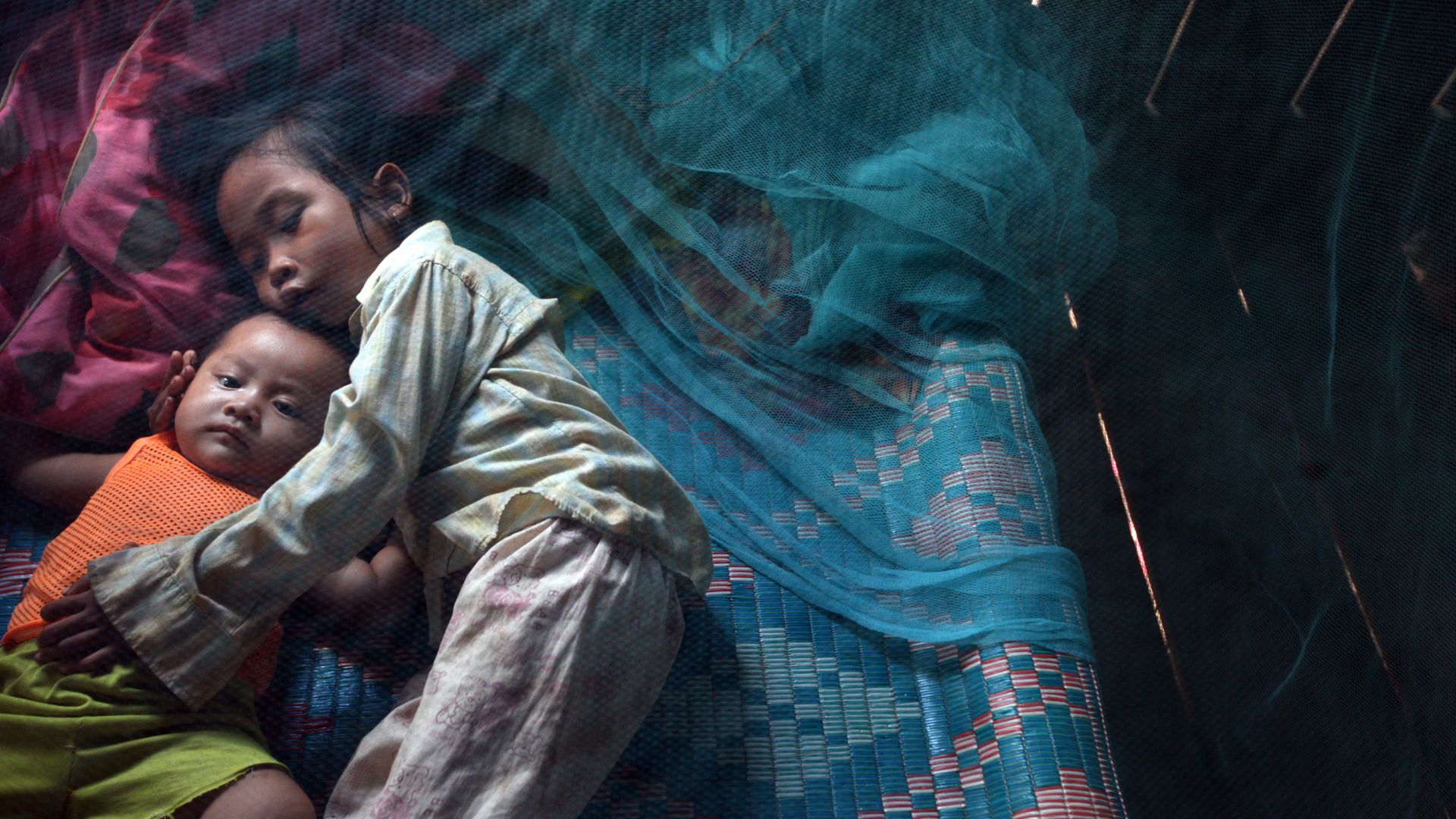The malaria vaccine could be a game-changer for global development
Add Axios as your preferred source to
see more of our stories on Google.

Two siblings rest beneath a malaria bed net in Cambodia. Photo: Paula Bronstein/Getty Images
The just-approved malaria vaccine could represent one of the biggest ever achievements in global development.
Why it matters: Malaria kills more than 400,000 people a year, more than half of whom are under the age of 5, and it notably slows the pace of economic growth in the sub-Saharan countries most affected by the mosquito-borne disease.
- Preventative measures and treatments do exist, but a vaccine would be the fastest way to cheaply save millions of lives over time.
- Blunting malaria's impact on the economy matters even more because COVID-19 could result in as many as 88 million Africans falling into extreme poverty, as the pandemic throws decades of global development progress into reverse.
Driving the news: The World Health Organization on Wednesday recommended the first vaccine against malaria for widespread use for children in sub-Saharan Africa and other at-risk regions, my Axios colleague Ivana Saric reported today.
- "Today’s recommendation offers a glimmer of hope for the continent which shoulders the heaviest burden of the disease," Matshidiso Moeti, WHO regional director for Africa, said in a statement.
By the numbers: In 2019, there were an estimated 229 million cases of malaria, 94% of which occurred in Africa.
- Malaria is a scourge of sub-Saharan Africa not just because of the sheer number of people it kills, but who it kills — primarily very young children who are robbed of the chance to live a long life.
- In 2016, malaria resulted in more than 56 million disability-adjusted life years (DALYs) lost, a metric used by global health experts to measure the full burden of a disease.
- Those who survive malaria incur medical costs and lost income, making the disease both a consequence of poverty and one of its causes — by one estimate malaria slows economic growth in Africa by up to 1.3% a year.
Context: Malaria's rampage on the continent isn't primarily because Africa is unusually hospitable to the Anopheles mosquitoes that carry the parasite that causes malaria.
- Historically, malaria killed throughout much of the world, from the Roman empire — which may have fallen in part because of a deadly malaria epidemic in the fifth century — to the modern U.S., which was only able to fully eradicate malaria in its last southern refuges in 1951 thanks to the efforts of the Atlanta-based Centers for Disease Control.
- Malaria still kills Africans in large numbers because the continent remains too desperately poor to stamp out the disease, with more than a third of the population of sub-Saharan Africa living under $1.90 a day.
How it works: The new vaccine, called Mosquirix and made by GlaxoSmithKline, targets children by rallying their immune defenses to fight off the malaria-causing Plasmodium falciparum parasite carried by certain mosquitoes.
- In clinical trials, the vaccine — which was given in multiple doses — had an efficacy of about 30% against deadly severe malaria over four years of study.
- That may seem weak by the impressive standards set by the new mRNA COVID-19 vaccines, but according to modeling studies, it's still strong enough to prevent 5.4 million cases and 23,000 deaths in children each year if it's rolled out to the hardest-hit countries.
What they're saying: "There’s potential for very, very significant impact," Ashley Birkett, who heads malaria programs at the global health nonprofit PATH, told the New York Times.
Between the lines: The impact could be so significant because a vaccine — unlike existing preventative measures — is comparatively easy to push out to those in need.
- Up until now, insecticide-treated bed nets — which protect sleeping people from mosquitoes during the times of the night when the insects are most active — have been one of the best lines of cheap defense against malaria.
- Funding the distribution of bed nets is considered one of the most effective ways to spend philanthropic money, costing just a few thousand dollars to avert one death from the disease.
- Yes, but: Bed nets still only cut malaria deaths in children by about 20%, and ensuring they get to those in need and are used correctly is a constant challenge — and one that could become unnecessary with a good vaccine.
What to watch... whether the global vaccine alliance GAVI determines Mosquirix is a worthwhile investment and puts billions behind developing and distributing the shots.
- Future malaria vaccines that take advantage of some of the same RNA methods used to make COVID-19 inoculations could be even more effective.
